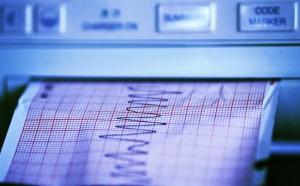 Monitoring critically ill patients is a big part of what a telemetry nurse does. Most of the patients these nurses work with are cardiac cases. Although telemetry is not a new field, the technology is improving and it is being used to serve more diverse groups of patients.
Monitoring critically ill patients is a big part of what a telemetry nurse does. Most of the patients these nurses work with are cardiac cases. Although telemetry is not a new field, the technology is improving and it is being used to serve more diverse groups of patients.
Definition of Telemetry Nurse
According to Discover Nursing, a telemetry nurse is defined by the profession as a nurse who “monitors a patient’s vital signs with an electrocardiogram or other life-sign measuring device.” Patients cared for by these professionals usually have gastrointestinal diseases, diabetes, coronary diseases or other conditions that require acute care.
Duties of a Telemetry Nurse
A telemetry nurse uses different devices and technology to monitor patient blood pressure and oxygen saturation, heart rhythms and respirations, and other data. Then they record the information and interpret the data to help the doctor assess how the patient is recovering and allow the physician to determine a treatment protocol. Since they are registered nurses, they also do patient care and offer pre-dismissal education about a patient’s condition. These nurses are in demand, because there is a shortage of critical care beds. That means that hospitals must step up or step down patient classification. This process, called “Progressive Telemetry Nursing” includes patients who are still critical or whose conditions may easily worsen to critical, but who are more are less stable. Wise Geek states the nurses are assigned about five patients at a time. They must be critical thinkers who can make rapid decisions. Another facet to telemetry goes beyond the bedside vigilance over acute care patients to those who are mobile and who wear transmitters that send vital signs to a deceiving station, allowing those patients to move around and yet be constantly monitored.
Education Required
These are registered nurses and most have their bachelor’s degrees. That means they have a minimum of two years of post-secondary education and have met all the qualifications for licensure, including work experience. Both the bachelor’s and the associate programs include lectures, clinical practicum and laboratory hours. The number of clinical hours required varies by state. They must have passed the NCLEX. Beyond this, they need additional education. This may come as classes offered by a hospital or medical center or it may be through certification through successful completion of the Critical Nursing Registered Nurse Exam. After that certification telemetry nurses can choose to specialize. Holding certifications can increase the potential for employment and allow nurses to earn more. The Advanced Cardiac Life Support is certification offered by the American Heart Association. People applying for this must complete two days, or twelve hours, of training, Another certification, the Progressive Care Certified Nurse is sponsored by the Association of Critical Care Nurses. To qualify for this certification you must have accumulated 1,750 hours of bedside acute care in the last two years and 5,000 hours of general experience as a registered nurse.
Related Resource: Palliative Care
Telemetry nurses earn a median salary of $55,432. Benefits and bonuses significantly increase this ad some nurses earn more than $80,000 a year. The job outlook is 22 per cent growth, which is far above average. What a telemetry nurse does will certainly change with advances in technology, but it will remain a rewarding and challenging branch of nursing.



